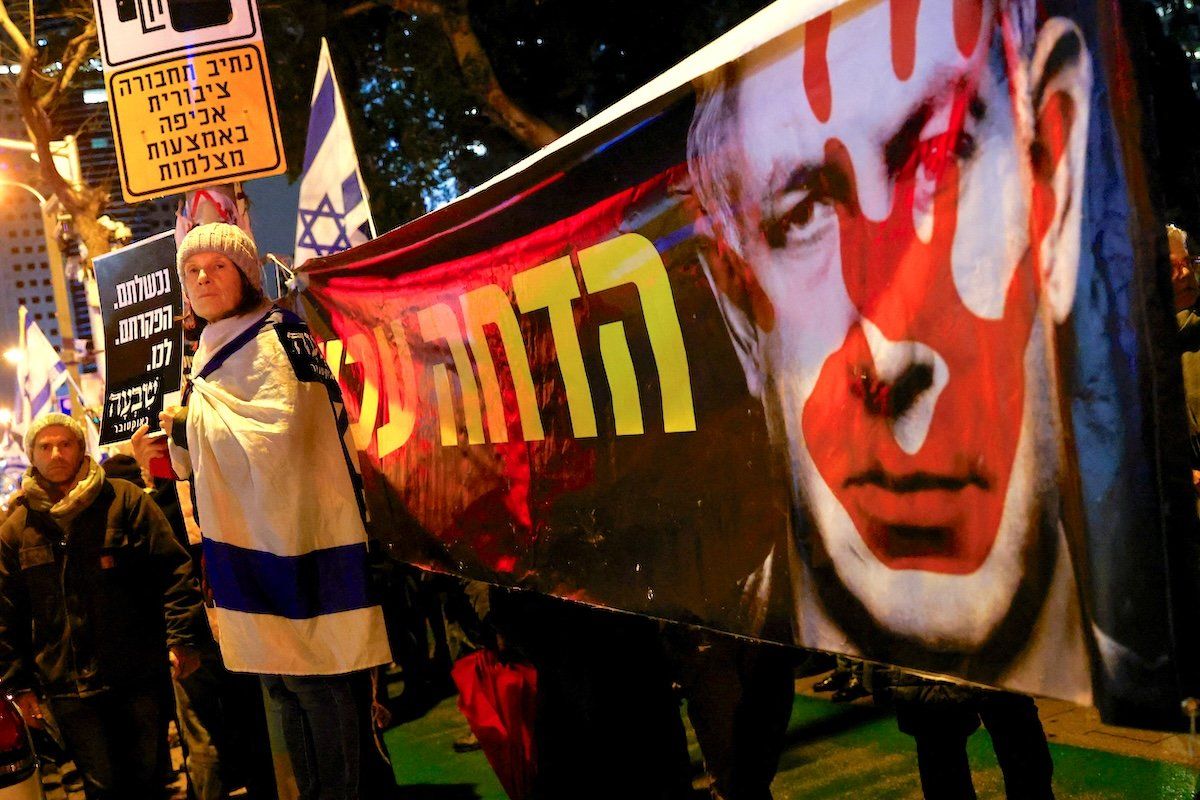Israeli Prime Minister Benjamin Netanyahu has faced growing calls to resign since the Oct. 7 attacks by Hamas. In recent days, protesters have gathered outside his home. The war in Gaza isn’t going well. Hamas is far from being destroyed, and roughly 130 hostages remain in Gaza – prompting their family members to storm parliament in outrage. Meanwhile, there are questions as to whether Bibi’s governing coalition will fall apart.
It often seems as though the 74-year-old leader is a breath away from being pushed out of office. But is this war really the last chapter in the chaotic career of Israel’s longest-tenured prime minister?
“After October 7th, everybody was saying, ‘I think he's finished. He's done.’ And he's still there. I think it's probably a matter of time, but it's already been several months,” says Mairav Zonszein, a senior Israel-Palestine analyst for the International Crisis Group who’s based in Israel, adding that it’s “hard to see what the specific tipping point will be that will bring him down.”
Even before Hamas attacked Israel on Oct. 7, Netanyahu’s political career was on thin ice as he contended with a corruption trial and mass protests over his government’s judicial overhaul plan. The Israeli leader has since faced blame for security failures surrounding the Hamas attack, on top of fierce criticism over the hostage situation and international criticism over the war in Gaza.
But Bibi has said he is opposed to a permanent cease-fire, even if it means bringing the hostages home – contending that it would only be a matter of time before Hamas attacked again. The current negotiations are reportedly for a limited cease-fire.
It’s complicated. Recent polling paints a complex picture in terms of how Israelis feel about the war – they’re angry at the people charged with protecting them – the ones running the war – but strongly support the fight against Hamas.
One recent poll from Tel Aviv University’s Peace Index showed most Israelis (53%) think the government has “no clear goals” in the war, but it also found that a large majority of the Jewish public think the IDF uses adequate or too little force in Gaza and 88% believe the extent of Palestinian casualties is justified – even as the international community increasingly criticizes Israel over the rising death toll. But the poll also found the Jewish public is relatively split on whether the government should prioritize eliminating Hamas at all costs (50%) or getting the hostages returned in any way possible (48%).
Still, one thing is clear: The Israeli public overwhelmingly disapproves of Netanyahu, with only 15% wanting him to stay in power after the war, according to a recent poll by the Israel Democracy Institute. And many seem to believe that Bibi views the war with Hamas as a political lifeline. A recent Channel 13 survey found 53% of Israelis believe Netanyahu’s wartime decisions are primarily motivated by personal interest.
“There’s a weird kind of paradox or conflict between the support that the war effort has – the legitimacy and consensus around wanting to remove Hamas – but then there's also consensus that Netanyahu has to go. Nobody trusts him,” says Zonszein, adding, “Everybody thinks that he's just dragging this out because it keeps him in power.”
Wartime elections? It’s becoming increasingly clear that Netanyahu’s goal of eliminating Hamas is “not feasible,” says Zonszein, and members of Bibi’s war cabinet have begun to openly challenge him on this.
Gadi Eisenkot, a war cabinet minister and former chief of staff of the IDF, recently said that discussions of destroying Hamas amount to “tall tales.” Eisenkot, whose son was killed in Gaza in December, said that elections should be held in the coming months.
Dozens of ex-top national security officials on Friday sent a letter to Israel’s president and speaker of parliament that pushed for elections and Netanyahu’s removal – referring to him as an “existential” threat to Israel.
In the end, rising public anger over the lack of movement on bringing the hostages home could be what brings Bibi down. Though it would be a “crazy scenario,” says Zonszein, for Israelis to go to the polls amid what is “probably the most decisive war Israel's had since its founding,” if a hostage deal isn’t reached in soon, “the pressure to have an election will increase.”
But a lot has to happen for elections to occur, and if there is a deal that brings the hostages home, it’s difficult to say what that would mean for Netanyahu’s political future.
“It seems like the only clear victory that he can get at this point is getting all the hostages back,” says Zonszein, but if this involves stopping the war and releasing Palestinian prisoners, it could trigger far-right members of his coalition to leave – putting Bibi in a precarious position.
But getting hostages released “would definitely be a huge relief and a huge win for Israel,” Zonszein adds, which has been “fighting with really no results so far.”
